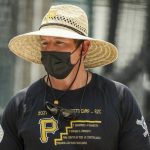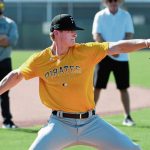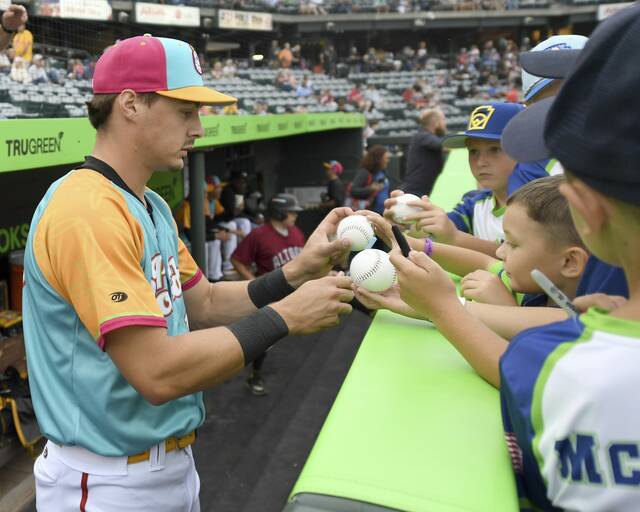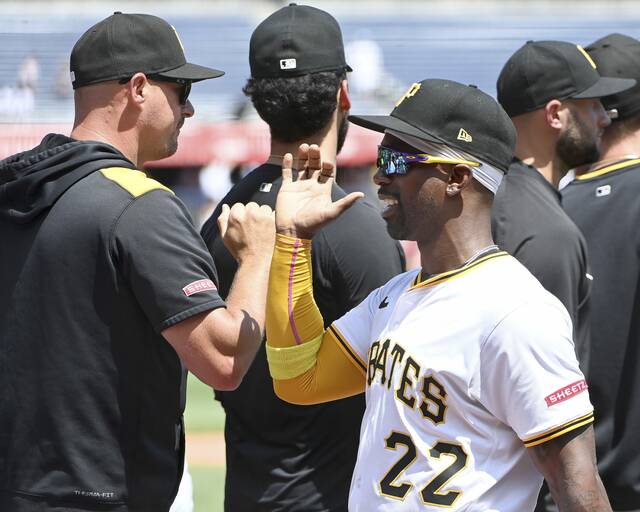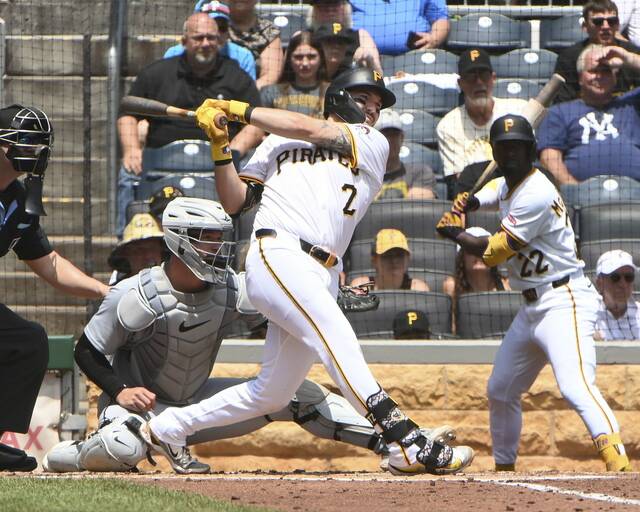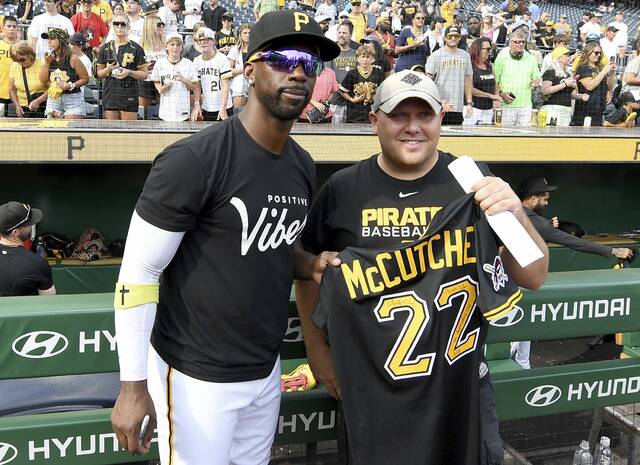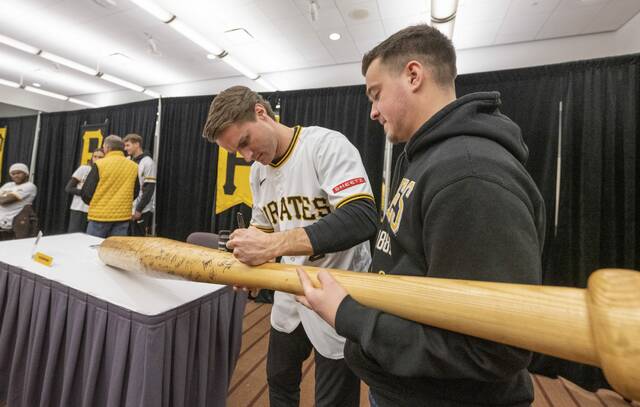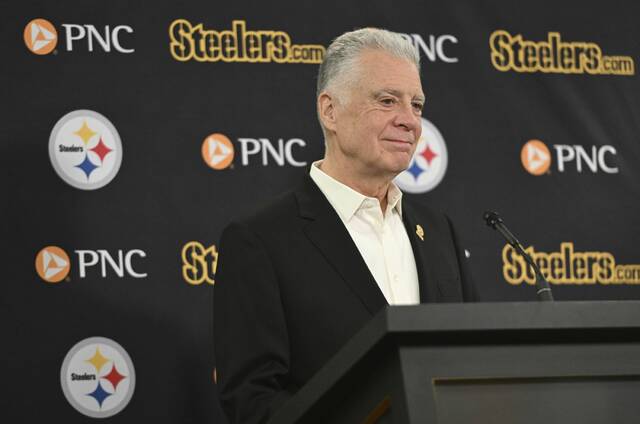With MLB in a lockout, the Pittsburgh Pirates are focusing their attention on their minor league players by embracing a philosophy that can come across as contradictory: In order to succeed, embrace failure.
Pirates director of coaching and player development John Baker casually paraphrases Marcus Aurelius in discussing discomfort, the reason for putting prospects in situations where they are supposed to struggle.
“The space between is never comfortable,” Baker said. “If we can identify that discomfort is our path towards growth and improvement, then that becomes a lit-up doorway. The obstacle, in a lot of ways, really is the way. … Identifying that is true, then doing it culturally to let everyone know that it’s OK to make mistakes. That’s how we learn.”
Upon being hired as general manager in November 2019, Ben Cherington placed a premium on drafting and development to rebuild the Pirates into a contender. By then, the failures of their farm system were magnified by the hollowness of their perceived success.
In 2014, Baseball America ranked the Pirates the No. 1 minor league system in baseball, with top-100 talents Gregory Polanco (10), Jameson Taillon (22), Tyler Glasnow (46), Austin Meadows (49), Nick Kingham (64), Alen Hanson (76) and Reese McGuire (81).
Over the past decade, that top farm system ranking translated to success at the major league level. The Kansas City Royals (No. 1 in 2011), Washington Nationals (2012), Chicago Cubs (2015), Los Angeles Dodgers (2016) and Atlanta Braves (2017-18) won World Series championships, and the St. Louis Cardinals (2013), Dodgers and Tampa Bay Rays (2020-21) were runners-up. The San Diego Padres reached the NL divisional round in 2020, a year after boasting baseball’s top farm system.
The Pirates’ prospects never matched their promise, as injuries and inconsistency plagued right-handed pitchers Glasnow, Kingham and Taillon and right fielder Polanco. Once considered the future core of the Pirates, none of those top-100 prospects remains with the team. Glasnow and Meadows were traded to the Rays, where they became All-Stars, and pitcher Shane Baz is a top-10 prospect. Josh Bell and Adam Frazier each had an All-Star season with the Pirates but were traded soon after for prospects.
“Development is an important aspect of this, not only at the minor league level but also at the major league level,” said J.J. Cooper, Baseball America’s editor in chief. “If I look at our No. 1 farm systems of the past decade, it’s kind of a Murderer’s Row of teams who really turned out from that. Then you look at the 2014 Pirates and say, ‘What happened there?’ I look back on it, and maybe we were off on some of these guys.”
‘It’s never over’
Largely through the trades of those players and the high draft picks from being one of baseball’s worst teams the past three years, the Pirates have replenished their farm system with top-100 talents: middle infielders Oneil Cruz, Liover Peguero and Nick Gonzales, catcher Henry Davis and right-handed pitchers Roansy Contreras and Quinn Priester. Baseball America ranks the Pirates’ farm system third, behind the Seattle Mariners and Rays.
The Pirates are banking heavily on the future success of those prospects, investing in the draft and international signings in the hopes of returning to the postseason for the first time since their wild-card runs of 2013-15. They can’t afford for their top prospects to fail at the major league level, nor can they rely exclusively on them to turn the organization around.
“The thing that stands out to me about the Pirates right now is that the top-end talent is impressive, but it’s the depth of the system right now that is eye-opening,” Cooper said, noting the strength of right-handed pitching and middle infielders. “Depth, obviously, gives you a wide array of options of players who can turn into a player who is really a useful part of a winning team. The other thing about depth is depth has a shelf life.”
Cherington pays attention to the top-100 rankings “because it’s an opinion outside the Pirates, and it’s important that we get feedback outside the Pirates.” Baker, however, is more blunt: “If you’re not first, you’re last.”
He is direct in stating that the goal is to win a World Series, and the Pirates believe their best bet to do so comes with building the best farm system in baseball. So Baker is not interested in celebrating a top-five minor league ranking just yet, even though he found personal joy in their minor league successes last year.
“We can pat ourselves on the back for like two minutes about 2021, but one message that I push to my staff and I’m happy to share this publicly: We can’t ever let success get in the way of improvement,” Baker said. “If I think I have something figured out, that’s when I have to have a serious check on my own ego and my own thinking because things cannot look the same. With more information, we should always be evolving and adapting to what we know now. It’s never over.”
Searching for diamonds
A former backup catcher with the Miami Marlins, Padres and Cubs, Baker draws from the dos and don’ts of his own 10-year playing career, his background as a mental skills coach and the unconventional approaches of mentors such as longtime Oakland A’s farm director Keith Lieppman and Baltimore Orioles major league field coordinator and catching instructor Tim Cossins.
A hitting session last year with former Pirates second-round pick Kevin Kramer was a reminder to Baker that traditional methods don’t always work. In an attempt to get Kramer to focus on his front foot, a hitting coach recommendead an unorthodox drill. In the batting cage at Pirate City in Bradenton, Fla., Kramer stood on a slope with his foot touching the rubber. The downhill step naturally forced him to make the desired movement.
Naturally, Baker wants to challenge Pirates prospects to step outside their comfort zones and embrace failure, which is why they take batting practice and do fielding drills with occular goggles. It’s why the Pirates are toying with the idea of having Gold Glove winners such as Greensboro third baseman Jared Triolo try new positions around the field, rather than wait until he reaches the majors like they did with shortstop Cole Tucker in the outfield.
Baker believes the emphasis on improvement revolves around practice design and training that challenges players and a culture that can support failure in both practice and training. That’s why so much of the focus is player-centric, on finding what works and what doesn’t. Figuring out a path to a goal doesn’t require a straight line.
Within that structure is a team-building concept that the Pirates are counting on to carry over from one level to the next, along with the promotions of minor league managers Miguel Perez to Triple-A Indianapolis and Kieran Mattison to Double-A Altoona. Baker wants to see less emphasis on showcase skills and more on what it takes to win in pressure situations, which requires players to learn from their failures.
“When we think about building pressure for the players — you want to squeeze them a bit so the diamonds emerge — to do that, you have to have a clear team goal, from level to level,” Baker said. “You have to want to win. And you have to do your damndest as an organization to build an environment where the players feel connected to each other. If I don’t want to lose because I don’t want you to lose also, I’m going to put some more pressure on myself to perform.
“When you go out and compete, you need to believe you have the skills necessary to get the job done. If we’re murdering people in training and they’re having no success, psychologically there would be no reason for them to believe. They’d be like, if I can’t do it in practice, I can’t do it in the game. Our coaches are very focused on being thoughtful about modulating practice to make sure that it fits into the gap we’re looking for, builds relationships with the players and, finally, giving them a say: What do you think about this? It’s much easier to hold someone accountable to their own idea.”
Where the Pirates were on the cutting edge in player development in the early years of the past decade, they failed to adapt when the rest of baseball caught on and made changes. That explains their emphasis on constant evolution, always staying ahead of the curve.
“If they’re doing something really innovative, we probably don’t know about it,” Baseball America’s Cooper said. “The reality of it is, nowadays the margins of advantage are small, and the windows of opportunity to have an advantage are even smaller. If you’re working on vision and mental skills, you’re not alone on any of those things. Different teams might be approaching them different ways. That’s where the game has changed in the last 10 years, is this realiziation that we should be figuring out as much as we can all of these things for our minor leaguers. If you can help them develop, that’s a massive win for the organization.”




